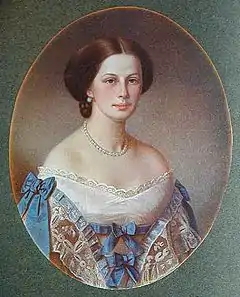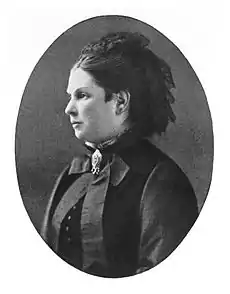Anna Filosofova
Anna Pavlovna Filosofova (Russian: Анна Павловна Философова; née Diaghileva; August 5, 1837 – March 17, 1912[1]) was a Russian feminist, activist, and philanthropist. From a wealthy background, Filosofova pushed for women's access to higher education. She led or founded a number of organizations designed to promote women's cultural and economic independence. Alongside Maria Trubnikova (1835–1897) and Nadezhda Stasova (1822–1895), was one of the founders and leaders of the first organised Russian women's movement. Together, the three were referred to as the "triumvirate".[2][3]
Anna Filosofova | |
|---|---|
 | |
| Born | Anna Pavlovna Diaghileva August 5, 1837 Saint Petersburg |
| Died | March 17, 1912 (aged 74) Saint Petersburg |
| Children | Dmitry Filosofov |
| Relatives | Sergei Diaghilev (nephew) |
Early life and education
Diaghileva was born into a wealthy noble family in Saint Petersburg.[4] Her father Pavel Diaghilev was an official with the Ministry of Finance who retired in 1850 and started a distillery business. In 1855 he became fanatically religious, and the responsibility of the family business was transferred to Diaghileva's mother. Diaghileva was the youngest of nine children. She received her education at home, following the custom of noble families of the time; she later wrote that all she learned was "French, German, and curtseying."[2] In 1855 she married Vladimir Dmitryevich Filosofov, a powerful official in the Ministry of War and Defence. Filosofova had six children, including the writer Dmitry Filosofov.[5] Their first child was born in 1858; they eventually had nine.[2][6]
Filosofova's husband came from a serf-owning family, and after their marriage she made frequent visits to the Filosofov estate in Bezhanitsy. Filosofov's father was known as a tyrannical figure, and the lifestyle at the estate had a powerful effect on Filosofova. It was here that she first began to reflect on social problems, and especially the plight of poor peasants and serfs.[4] Filosofova's father-in-law sexually abused the serfs under his control.[6] Upon the liberation of the serfs, several years later, Filosofova wrote that it was a "holy day."[6]
She found court life boring; Filosofova's first philanthropic activities concerned providing food and medicine to the poor. It was around this time that she met Maria Trubnikova, a woman interested in social change who gave Filosofova books on women's issues and discussed them with her.[5] Filosofova said of Maria that she was "an angel, gentle and patient. She developed me, read with me. This was hard, since I didn't know anything."[4] She credited Trubnikova with helping develop her beliefs.[6] Filosofova did not wish to be subordinate to her husband, writing to him that "to yield to you is beyond my power."[6]
Activism and career
Through Trubnikova's salon, Filosofova became connected with a large group of wealthy women concerned with the economic and educational status of women in Russia.[6] Filosofova (along with Trubnikova, Stasova, and others) founded the Society for Cheap Lodgings and Other Benefits for the Citizens of St. Petersburg in 1859.[2][6] The group had two factions, the "German party" and the "Russian party", which differed on their preferred approach.[3] The "Germans" favored a traditional, supervised philanthropy to institutions and supervision of the poor. The "Russians" focused on self-help and direct aid, attempting to avoid patronization and maintain the privacy of those aided.[3][6] In early 1861, the organization split in two, with the "triumvirate" leading the "Russians".[3] The reduced group's charter was approved in February 1861.[3][6] The organization provided housing and work as seamstresses to its female clients (primarily widows and wives whose husbands had abandoned them).[3] It included a day care and a communal kitchen.[3] The society acquired its own building, and a large contract for sewing work from the military. Trubnikova was the first president; Filosofova also served as president of the society for a number of years until its closure in 1879.[6]

Filosofova was the founder of one of the literary discussion circles which were fashionable at the time, together with Trubnikova and Stasova:[4] Trubnikova, the daughter of one of the participants of the Decembrist revolt, was a friend of Josephine Butler and acquainted with Western feminist literature. Trubnikova and the other members of the "triumvirate" were not radical in style or fashion, and retained their status in the upper class.[6][7] Criticized by a nihilist adherent for dressing like "a doll" at an important meeting, Filosofova replied that "clothes do not make the woman", according to academic Rochelle Ruthchild.[6]
Women's education
Filosofova did provide support for a proposed large-scale Society for Women's Labor in 1865, but the organization never reified.[2] Filosofova, Trubnikova and Stasova also began pushing, in 1867, for Russian universities to create courses for women.[2] Demonstrating "considerable skill in rallying popular support", according to the historian Christine Johansen, the women wrote a carefully-worded petition to Tsar Alexander II.[8] They gathered over 400 signatures among middle and upper-class women.[8] However, there was widespread opposition to the education of women, including by the relevant minister, Dmitry Tolstoy.[5] Tolstoy argued that women would abandon education after being married, and dismissed the signatories by stating that they were "sheep" merely following the latest fashion.[8] He rejected the petition in late 1868, but allowed mixed-gender public lectures which women could attend.[8] However, these were rapidly taken up, overwhelmingly by women.[2][8]
The "triumvirate" also appealed to war minister Dmitry Milyutin, who agreed to host the courses after being persuaded by his wife, daughter, and Filosofova. Tolstoy countered by allowing the lectures at his own apartments, where he could monitor them.[8] The political movement in favor of women's education continued to grow, and by October 1869, the Russian government permitted a limited set of courses for women on advanced subjects.[8][5] The courses began in January 1870.[5] They were known as the Vladimirskii courses, after their host beginning in 1872, the Vladimir college.[8] Some female students felt they did not go far enough, and formed a separate set of lectures called the Alarchinskie Courses.[8] Many women seeking higher education went abroad in order to complete their education, largely to Zurich.[8] The courses were closed in 1875. In 1876 Filosofova was able to get official permission to open the first Russian women's university, known as the Bestuzhev Courses after their nominal founder Konstantin Bestuzhev-Ryumin.[3][5]
Exile and return
Filosofova was known for her kindness and generosity, and she was often approached for help by the families of convicted and exiled revolutionaries. Her sympathies for these revolutionaries were unpopular with Russian officials. In 1879 she was exiled abroad for giving aid to revolutionary organisations, and only allowed to return in 1881.[9] After the assassination of the Tsar in 1881, Filosofova, now known for her revolutionary sympathies, could not find supporters for further social projects. Her husband's official position was also weakened because of her revolutionary connections,[4] and the family was forced to live more modestly.[5]

Filosofova returned to public life in the late 1880s and early 1890s when she began providing assistance for starving people in the Volga Region. In 1892 she joined the "Saint Petersburg Committee for the Promotion of Literacy". In 1895 she founded and chaired the "Charity Association of Russian Women", a feminist organisation that was officially denominated a charity organisation because all forms of political activity were banned in Russia. The same year, a women's university of medicine was founded in Russia, and in 1904 women's university courses were again allowed outside of the capital. In connection with this, Filosofova was recognized by Tsar Nicholas II in 1904 for her work within the "Society for the Finance of Education courses for Women".[2] In 1905, the universities of Russia were opened to women and the women's university courses were no longer necessary. The same year, men were granted suffrage and political activity was permitted, after which the women's group presented their first demand for women suffrage.[5]
Later activities
Filosofova was elected chairman of the International Council of Women in 1899, attending its first meeting in London.[2][9] She participated in the Russian Revolution of 1905, joining the Constitutional Democratic Party and eventually acting as chairman of the first Russian women's congress in 1908.[2] Filosofova's aims of unifying Russian women were unsuccessful, mostly due to the number of factions within the movement. After the congress, Filosofova and some of her associates received deprecating letters from the ultra-conservative Duma deputy Vladimir Purishkevich; he called it "an assembly of whores."[2][5] Filosofova made the letter public and took Purishkevich to court, where he was sentenced to one month in jail.[5]
In 1908 Filosofova joined the Russian Theosophical Society, which she had helped to set up. In 1911 Russia celebrated the fiftieth jubilee of Filosofova's public activities, representing the progress and achievements of the women's movement in Russia. The jubilee was attended by more than one hundred women's organisations who presented addresses, along with several foreign groups. She was also honored by deputies of the Duma at the Mariinsky Palace. She died in Saint Petersburg, and her funeral was attended by thousands of people.[5]
References
- "Saint Petersburg Encyclopedia". Retrieved 27 November 2011.
- Rappaport, Helen (2001). Encyclopedia of women social reformers. Vol. One (A-L). Santa Barbara, Calif.: ABC-CLIO. pp. 224–6. ISBN 978-1-57607-101-4.
- Engel, Barbara Alpern (2000). "Searching for a politics of personal life". Mothers and daughters: women of the intelligentsia in nineteenth-century Russia. Studies in Russian literature and theory. Evanston, Ill: Northwestern University Press. ISBN 978-0-8101-1740-2.
- Worobec, Christine (2009). The Human Tradition in Imperial Russia. Rowman & Littlefield. p. 74. ISBN 978-0-7425-3737-8. Archived from the original on 2023-09-24. Retrieved 2011-11-27.
- de Haan, Francisca; Daskalova, Krasimira; Loutfi, Anna (2006). Biographical Dictionary of Women's Movements and Feminisms in Central, Eastern, and South Eastern Europe: 19th and 20th Centuries. Central European University Press. pp. 135–138. ISBN 963-7326-39-1. Archived from the original on 2023-09-24. Retrieved 2011-11-27.
- Ruthchild, Rochelle G. (2009). "Reframing public and private space in mid-nineteenth century Russia : the triumvirate of Anna Filosofova, Nadezhda Stasova, and Mariia Trubnikova". In Worobec, Christine D. (ed.). The human tradition in imperial Russia. The human tradition around the world. Lanham, Md.: Rowman & Littlefield. ISBN 978-0-7425-3737-8.
- Johanson, Christine (1987). Women's struggle for higher education in Russia: 1855 - 1900. Kingston, Canada: McGill University Press. ISBN 978-0-7735-0565-0.
- Johanson, Christine (1987). "Chapter II: The Politics of Minimal Concessions - Women's Courses in Moscow and St. Petersburg". Women's struggle for higher education in Russia: 1855 - 1900. Kingston, Canada: McGill University Press. ISBN 978-0-7735-0565-0.
- Taruskin, Richard (1996). Stravinsky and the Russian Traditions: A Biography of the Works Through Mavra, Volume 1. Oxford University Press. p. 428. ISBN 0-19-816250-2. Retrieved 2011-11-27.